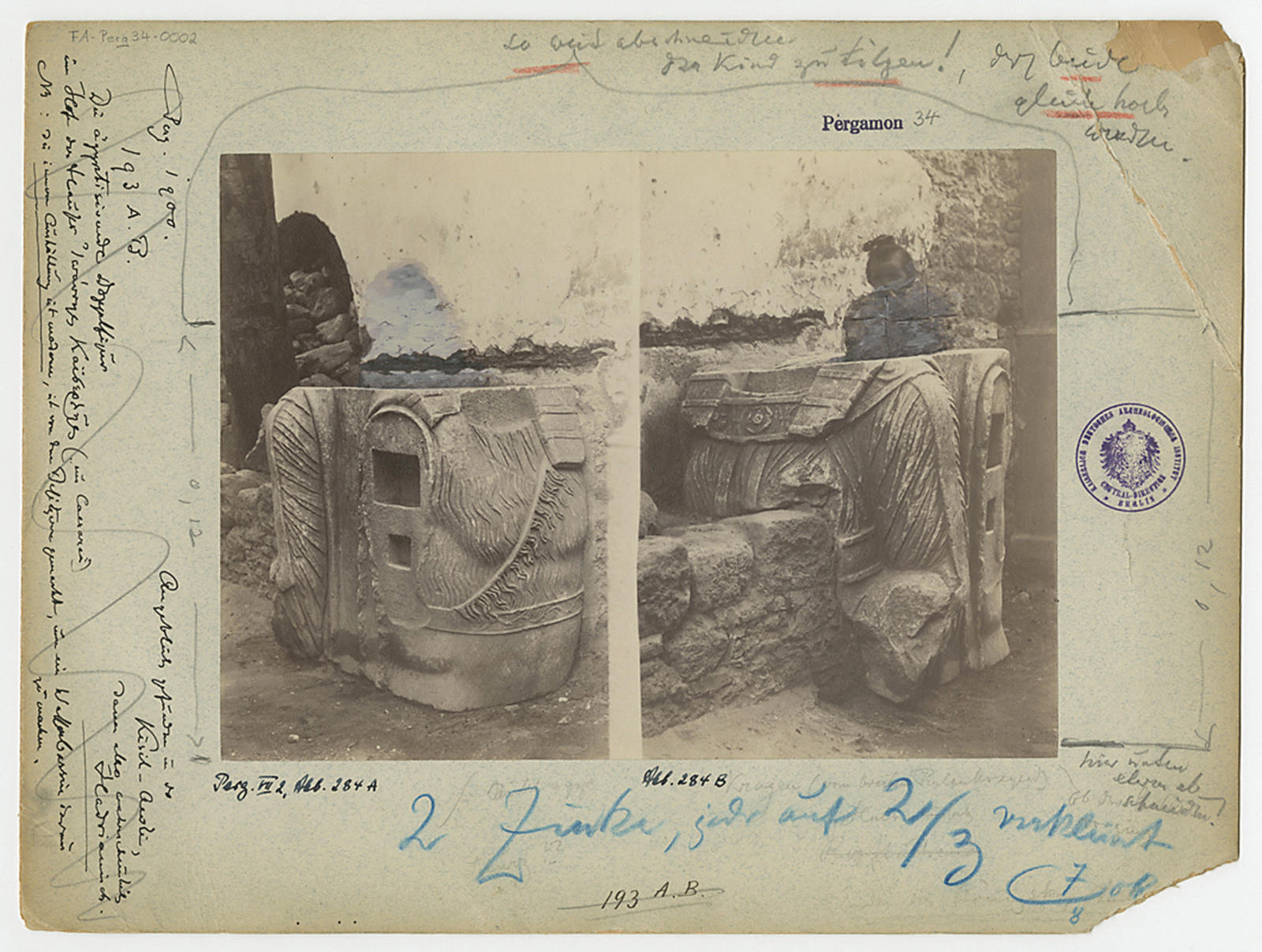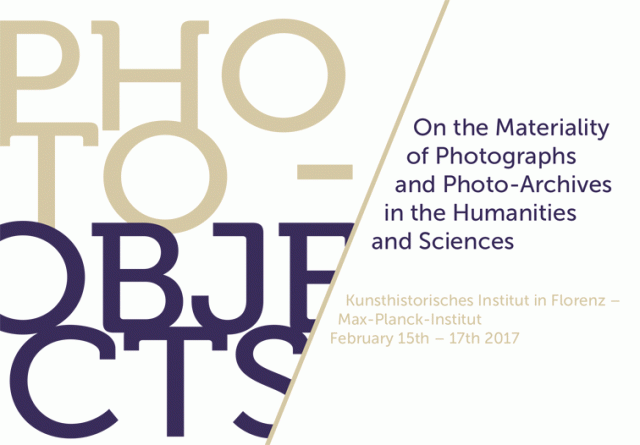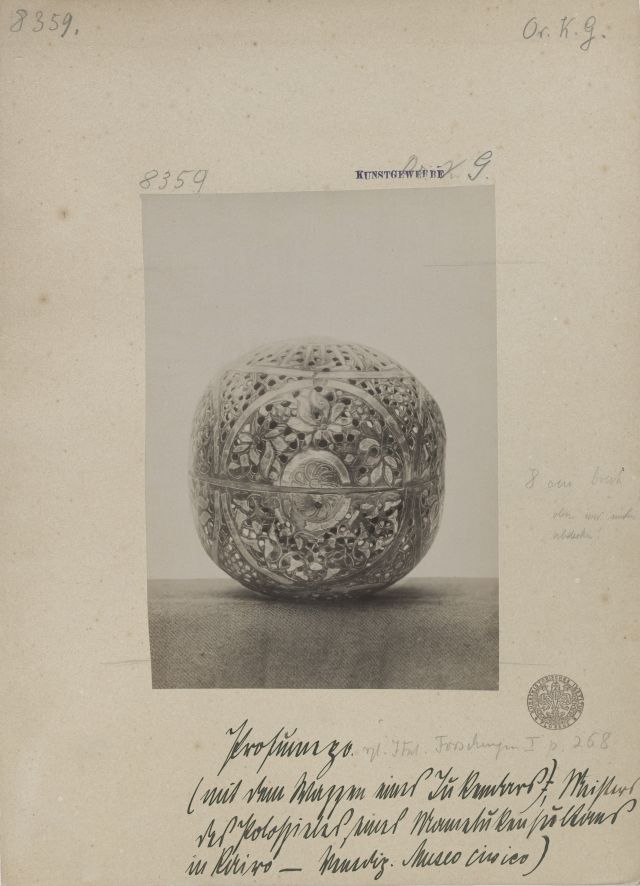Simposio
Photo-Objects. On the Materiality of Photographs and Photo-Archives in the Humanities and Sciences
A conference of the collaboration project "Photo-Objects. Photographs as Research Objects in Archaeology, Ethnology and Art History"
Photothek des Kunsthistorischen Instituts in Florenz – Max-Planck-Institut / Kunstbibliothek, Staatliche Museen zu Berlin – Preußischer Kulturbesitz / Antikensammlung, Staatliche Museen zu Berlin – Preußischer Kulturbesitz / Institut für Europäische Ethnologie, Humboldt-Universität zu Berlin, funded by the Bundesministerium für Bildung und Forschung, www.fotobjekt.hypotheses.org.

Photographs are not only images, but also historically shaped three-dimensional objects. They hold a physical presence, bear traces of handling and use and circulate in social, political and institutional networks. Beyond their visual content they are now increasingly acknowledged as material "actors" not only indexically representing the objects they depict but also playing a crucial role in the processes of meaning-making within scientific practices. Thus, photographs lead a double existence as both pictures of objects and material objects in their own right.
Most scientific disciplines rapidly adopted photography as an important research tool to document everything from excavation sites, costumes and artworks in museums to snowflakes under a microscope – through photographs such objects of research, were detached from their original surroundings, put in standardized and transportable formats, newly contextualized and made comparable. Especially the material qualities of photographs have shaped their adoption in the various disciplines by affording certain types of uses. Inscriptions in and the handling of photographs made "photo-objects" applicable to the sciences and humanities. This way they could be classified, archived and thus satisfy the positivistic demand for "objectivity". The formation and definition of many academic disciplines is therefore not conceivable without photography. These processes were encouraged by the foundation of specialized photo-archives as interfaces of technology and science. They were and still are laboratories of scientific thought, in which objects of all kinds are part of a dynamic and material system of knowledge, interacting with and reacting to each other – from "photo-objects" in their various manifestations to storage furniture, card catalogues, inventory books, reference lists, prints and illustrated publications.
Photographs are not only images, but also historically shaped three-dimensional objects. They hold a physical presence, bear traces of handling and use and circulate in social, political and institutional networks. Beyond their visual content they are now increasingly acknowledged as material "actors" not only indexically representing the objects they depict but also playing a crucial role in the processes of meaning-making within scientific practices. Thus, photographs lead a double existence as both pictures of objects and material objects in their own right.
Most scientific disciplines rapidly adopted photography as an important research tool to document everything from excavation sites, costumes and artworks in museums to snowflakes under a microscope – through photographs such objects of research, were detached from their original surroundings, put in standardized and transportable formats, newly contextualized and made comparable. Especially the material qualities of photographs have shaped their adoption in the various disciplines by affording certain types of uses. Inscriptions in and the handling of photographs made "photo-objects" applicable to the sciences and humanities. This way they could be classified, archived and thus satisfy the positivistic demand for "objectivity". The formation and definition of many academic disciplines is therefore not conceivable without photography. These processes were encouraged by the foundation of specialized photo-archives as interfaces of technology and science. They were and still are laboratories of scientific thought, in which objects of all kinds are part of a dynamic and material system of knowledge, interacting with and reacting to each other – from "photo-objects" in their various manifestations to storage furniture, card catalogues, inventory books, reference lists, prints and illustrated publications.
Taking photographic materiality as its premise the conference will analyze the epistemological potential of analog and digital photographs and photo archives in the humanities and sciences. Contributions from all disciplines will be discussed from a comparative point of view. The conference also aims to critically examine the conceptualization of photographic materiality and mobility through such terms as "biography", "itinerary" and "network" from a methodological and self-reflexive perspective. Taking the material aspects of photographic practices in the humanities and sciences as a starting point, the papers will deal with the circulation and distribution of photographs, the construction of methods through the handling and use of photographs in the various disciplines, arrangement, classification and working processes in photo-archives, as well as photographs in different institutions (i.e. archives, museums, research institutes and laboratories).
Keynote-Speakers:
Lorraine Daston, Max-Planck-Institut für Wissenschaftsgeschichte, Berlin
Elizabeth Edwards, De Montfort University, Leicester
Speakers:
Zeynep Çelik (New Jersey Institute of Technology–Rutgers University)
Idil Çetin (Galatasaray University, Istanbul)
Haidy Geismar (University College London) and Pip Laurenson (Tate London / Maastricht University)
Lena Holbein (DFG-Graduiertenkolleg Das fotografische Dispositiv, Hochschule für Bildende Künste Braunschweig)
Vered Maimon (Tel Aviv University Ramat Aviv)
Maria Männig (Karlsruhe)
Anaïs Mauuarin (Université Paris 1 Panthéon-Sorbonne, Paris)
Omar Nasim (Universität Regensburg)
Suryanandini Narain (Jawaharlal Nehru University, New Delhi)
Christopher Pinney (University College London)
Christina Riggs (University of East Anglia, Norwich)
Katharina Sykora (DFG-Graduiertenkolleg Das fotografische Dispositiv, Hochschule für Bildende Künste Braunschweig)
Petra Trnková (Czech Academy of Sciences Husova, Prague)
Kelley Wilder (Photographic History Research Centre, DeMonfort University, Leicester)
Part of the conference will be a workshop on the "Photo-Objects" project.
Organization:
Costanza Caraffa und Julia Bärnighausen, Photothek des Kunsthistorischen Instituts in Florenz – Max-Planck-Institut.
We thank the Istituto degli Innocenti for collaboration.
Scarica
Partner
In cooperazione con
Con il sostegno di
15 – 17 febbraio 2017, ore 18:09
Istituto degli Innocenti
Sala Brunelleschi
Piazza della Santissima Annunziata 12
50121 Firenze
16 febbraio 2017, ore 14:00
Kunsthistorisches Institut in Florenz
Max-Planck-Institut
Palazzo Grifoni Budini Gattai
Via dei Servi 51
50122 Firenze
Avviso
Questo evento viene documentato fotograficamente e/o attraverso riprese video. Qualora non dovesse essere d’accordo con l’utilizzo di immagini in cui potrebbe essere riconoscibile, da parte del Kunsthistorisches Institut in Florenz a scopo di documentazione degli eventi e di pubbliche relazioni (p.e. social media) la preghiamo gentilmente di comunicarcelo.




